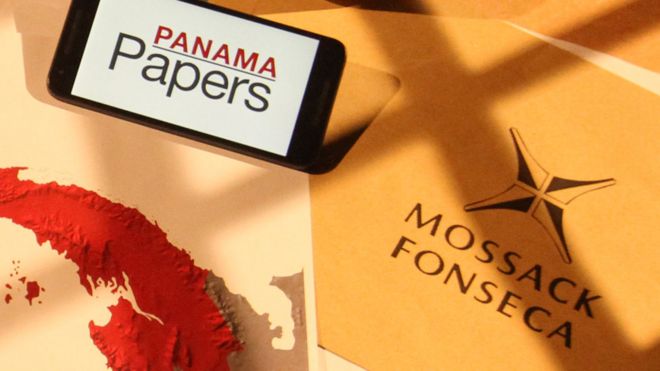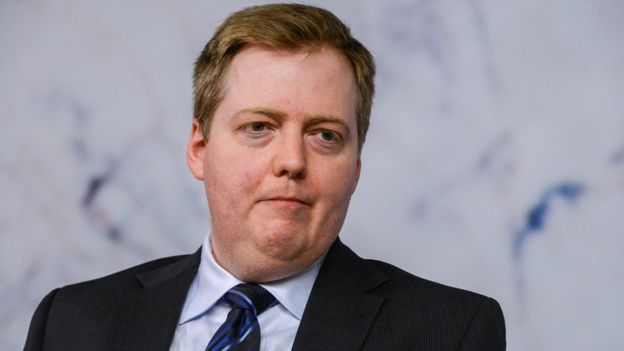Panama Papers: Leaks spur global investigations
- 43 minutes ago
- World

Authorities across the world are being spurred into action after a huge leak of confidential documents revealed how tax havens are used to hide wealth.
Eleven million documents were leaked from the secretive Panamanian law firm Mossack Fonseca.
They show how the company has helped some clients launder money, dodge sanctions and avoid tax.
The company says it has operated beyond reproach for 40 years and has never been charged with criminal wrong-doing.
A number of investigations have been launched since the first revelations late on Sunday by Austrian, Dutch and Australian authorities, among others.
The documents feature 12 current or former heads of state, and at least 60 people linked to current or former world leaders.
The files reveal a suspected billion-dollar money laundering ring involving close associates of Russia's President Vladimir Putin.
Iceland's Prime Minister, Sigmundur David Gunnlaugsson, is also shown to have had an undeclared interest linked to his wife's wealth.
By Monday morning, 16,000 people in Iceland had signed a petition demanding his resignation, and a large protest was expected in Reykjavik later.
Mr Gunnlaugsson has ruled out stepping down.
The leaked documents also show that Ian Cameron, the late father of UK Prime Minister David Cameron, was a Mossack Fonseca client.
Gerard Ryle, director of the International Consortium of Investigative Journalists (ICIJ), who co-ordinated the investigations, said the documents covered the day-to-day business at Mossack Fonseca over the past 40 years.
"I think the leak will prove to be probably the biggest blow the offshore world has ever taken because of the extent of the documents," he said.
Panama Papers - tax havens of the rich and powerful exposed
 AFP/getty Images
AFP/getty Images- Eleven million documents held by the Panama-based law firm Mossack Fonseca have been passed to German newspaper Sueddeutsche Zeitung, which then shared them with the International Consortium of Investigative Journalists. BBC Panorama and UK newspaper the Guardian are among 107 media organisations in 78 countries which have been analysing the documents. The BBC does not know the identity of the source
- They show how the company has helped clients launder money, dodge sanctions and evade tax
- Mossack Fonseca says it has operated beyond reproach for 40 years and never been accused or charged with criminal wrong-doing
- Tricks of the trade: How assets are hidden and taxes evaded
- Panama Papers: Full coverage; follow reaction on Twitter using #PanamaPapers; in the BBC News app, follow the tag "Panama Papers"
- Watch Panorama at 19:30 on BBC One on Monday, 4 April, or catch up later on the BBC iPlayer (UK viewers only)
Also mentioned are the brother-in-law of China's President Xi Jinping; Ukraine's President Petro Poroshenko; and Argentina's President Mauricio Macri.
In the latest reaction
- Hussain Nawaz Sharif, the son of Pakistan's Prime Minister, Nawaz Sharif, and one of three siblings shown to own real estate through offshore entities, says "there is nothing wrong with it"
- The HM Revenue and Customs (HMRC) in the UK says it has received "a great deal of information on offshore companies" as it investigates - it is also asking the ICIJ to share all its data
- Austria's financial markets regulator says it is investigating whether two banks breached rules on money laundering after being named in the leaks
- France's finance ministry says it is seeking the original documents in the leak for its own investigation
- Australia's tax office says it is investigating 800 individuals named in the leaks
- A spokesman for Azerbaijan's president Ilham Aliyev, whose children are named as owners of offshore companies, says such practice "is not banned by any law", adding that they "are grown up Azerbaijani citizens"
- Dmitry Peskov, the spokesman for Russia's President Vladimir Putin, says evidence was "concocted" and Mr Putin is the target of "disinformation"
- China appears to be censoring social media posts on the document leak, which has named several members of the country's elite
The leak reveals a suspected billion-dollar money laundering ring that was run by a Russian bank and involved close associates of President Putin.
The operation was run by Bank Rossiya, which is subject to US and EU sanctionsfollowing Russia's annexation of Crimea.
The documents reveal for the first time how the bank operates.
Money has been channelled through offshore companies, two of which were officially owned by one of the Russian president's closest friends, Sergei Roldugin.
On paper, Mr Roldugin has personally made hundreds of millions of dollars in profits from suspicious deals.
But documents from Mr Roldugin's companies state that: "The company is a corporate screen established principally to protect the identity and confidentiality of the ultimate beneficial owner of the company."
The Kremlin spokesman said it was clear the main target of the reports was Mr Putin, as well as Russia's political stability ahead of parliamentary elections.
Dmitry Peskov dismissed the investigation as insinuation and speculation, and suggested many of the team of journalists behind it were actually former US state department and CIA officials.
Another case highlights how Mossack Fonseca offered financial services designed to help business clients hide their wealth.
One wealthy client was offered fake ownership records to hide money from the authorities. This is in direct breach of international regulations designed to stop money laundering and tax evasion.
In a statement, Mossack Fonseca said the allegations that it provided a structure designed to hide the source of money were "completely unsupported and false".
"We do not provide beneficiary services to deceive banks. It is difficult, not to say impossible, not to provide banks with the identity of final beneficiaries and the origin of funds."
 AP
AP
Mossack Fonseca data also shows how Icelandic Prime Minister Sigmundur David Gunnlaugsson had an undeclared interest in his country's failed banks.
Mr Gunnlaugsson has been accused of hiding millions of dollars of investments behind a secretive offshore company called Wintris.
He did not declare an interest in the company when entering parliament in 2009. He sold his 50% of Wintris to his future wife for $1 (70p), eight months later.
The offshore company was used to invest millions of dollars of inherited money, according to a document signed by Mr Gunnlaugsson's wife, Anna Sigurlaug Palsdottir, in 2015.
Mr Gunnlaugsson is facing calls for his resignation, but said on Monday that this was not something he was considering.
He apologised for his poor performance in an earlier interview, when he walked out after a question about Wintris.
The prime minister stressed that his wife had always paid taxes in Iceland.
He says he has not broken any rules and his wife did not benefit financially from his decisions.
Mossack Fonseca says offshore companies are available worldwide and are used for a variety of legitimate purposes.
"If we detect suspicious activity or misconduct, we are quick to report it to the authorities," it said. "Similarly, when authorities approach us with evidence of possible misconduct, we always cooperate fully with them."

No comments:
Post a Comment